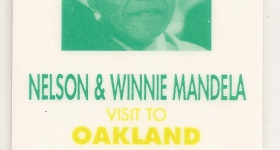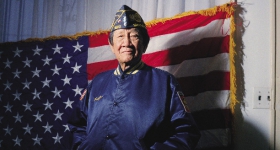Former Hyphen publisher Lisa Lee reflects on her childhood years spent in South Africa.
Photo: Lisa Lee with a group of her classmates in 1998 at St. Mary's DSG, a women's boarding school in Pretoria, South Africa.
“This is how you use a Taser,” my father said calmly,
as he held the black flashlight-like device and made the electric shocks come
alive in front of my brother and I. “Here, both of you try it. It’ll
be underneath my pillow if we need to use it.”
It was the eve before something big was about to happen. In
1994, I was ten years old. Brian, my older brother, twelve. Typically, bedtime
meant retreating to our own separate bedrooms, but that night, my reserved
immigrant father requested that my brother and I sleep upstairs in the master
suite with him. All my father divulged was that if a man was not elected the
president of South Africa, then a riot would most likely breakout. Even though
we’re Chinese and considered to be “coloreds” in most countries, we
needed to be prepared because no one would be safe.
My ten year-old self wondered about the man I saw on TV with
the contagious smile and the significance of the huge lines of people waiting
patiently to vote for him.
Little did I know, then, that the man my father was referring
to was a man named Nelson Mandela, a man who had been imprisoned for over 27
years because he fought to end apartheid in South Africa, a system of racial
segregation under which the rights of the majority black citizens were severely
diminished. It was only years later when I was living in the United States that
I realized the magnitude of the history that I had witnessed.
To my father’s relief, the outpour of support of black South
Africans on April 27th, 1994, ensured Mandela’s place as the country’s first
black president. A riot never broke out, at least not then. Instead, joy filled
the air. Mandela symbolized freedom—that finally, after years of living as
second-class citizens in their own country, black South Africans could finally live.
Over the course of the next few months, a new story of South Africa emerged. This time, it's a story that made the natives proud. Our history classes changed and I started to
learn about Shaka Zulu, one
of the most influential South African leaders. I learned of his bravery to
fight off colonizers instead of learning about the Cape of Good Hope, where “friendly” trading
took place between the Europeans and South Africans. Thanks
to the immediate reforms that Mandela mandated, I saw an increasing number of black
students in my public primary school, where there were none before. My
world started to shift and I watched Mandela and his warriors push forward
amidst the racism of all who doubted him and everyone with darker skin.
This was merely 20 years ago.
Mandela’s passing on December 5th, 2013, left me with a variety
of emotions. I was beyond sad, angry, and shaken up. How do you begin to talk
about a man whose life has always been bigger than life itself?
In the past, I’ve felt guilt and shame for having great
childhood memories during a time when South Africa was truly broken. However,
to have grown up in South Africa during those years and to have breathed
Mandela’s ideals have had a huge impact on me. I see now that his unwavering
faith in democracy and steadfast strength to guide his nation to true equality
for all have been the north star in my own beliefs. Even though I was an
ignorant little girl during Mandela’s most heightened years, a Chinese
immigrant from a community that hardly appeared in any of the history books
about South Africa’s new freedom, he was and is Tata Madiba to me.
Despite the difference in our physical appearances, Mandela’s legacy explains the conviction that I have for the
work that I do as a diversity architect who advocates for the communities that
have been left behind in the midst of tech innovations. More importantly, beyond
equality, Mandela’s influence made me feel at home when I was in a country that
was not my own, and that is what I want to do for the rest of my life—build
places, spaces and communities for those who have been racially marginalized in order to truly feel at home.
On December 5th, the world lost a symbol and I lost a father.
But deep down inside, I know that the best way to honor his life’s work is
simply to follow in his footsteps. He knew, and we know, that his work is far
from over. We must honor him with our
commitment and our actions to shape
our world to be one where human rights are equal for everyone. We may never see
the likes of Nelson Mandela again, but if we let him live inside of us, perhaps
we won’t have to.
+ + +
Lisa Lee is the diversity
program manager at Facebook and the former publisher of Hyphen. She is
also the cofounder of ThickDumplingSkin.com, an online community that aims to
address body image and eating disorders amongst the Asian American community.
Lisa lived in South Africa with her family from 1993–1999.
Note: Nelson Mandela's state funeral takes place Sunday, December 15th.









Comments